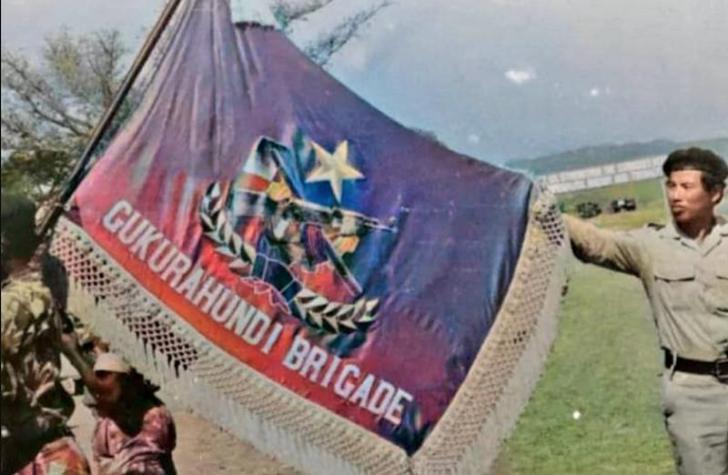News / National
Mnangagwa should release the Dumbutshena, Chihambakwe reports
16 Jul 2024 at 19:54hrs |
0 Views

The government should release reports by two commissions that investigated the Gukurahundi genocide "as part of truth telling" ahead of new public hearings in Matabeleland which President Emmerson Mnangagwa hopes will bring closure to victims, the Heal Zimbabwe Trust said on Tuesday.
The Gukurahundi Community Engagement Outreach Programme launched by Mnangagwa in Bulawayo last Sunday is a "significant step, but it must be accompanied by sincere and inclusive efforts," the NGO said.
"The government must release the reports of the Dumbutshena and Chihambakwe Commissions of Inquiry as part of truth-telling," Heal Zimbabwe Trust said.
The Zimbabwe Commission of Inquiry into the Matabeleland Disturbances set up by the late former president Robert Mugabe and chaired by Justice Simplisius Chihambakwe carried out its work between 1983 and 1984 but its findings were never published.
It came after another enquiry in 1981 when Justice Enoch Dumbutshena led a panel of seven which inquired into the mutinous disturbances which took place in February 1981 at Glenville Military Camp, Ntabazinduna Military Camp, and Entumbane ZANLA and ZIPRA Camps.
Mnangagwa, then the justice minister, told the Supreme Court in 2003 during a lawsuit brought the Zimbabwe Lawyers for Human Rights and the Legal Resources Foundation that the findings and recommendations of the Dumbutshena Commission "were solely for use by the government and the government had no legal duty to divulge the findings to the general public."
"In any case, because of the sensitivity of the matter at the time the report was presented to government, it was not reproduced and as of now it has not been located," he added.
Retired High Court judge Selo Nare, as chairman of the National Peace and Reconciliation Commission (NPRC) in 2019, told journalists that the government had told him that both reports "have been lost."
Few however believe the documents have been lost, and fear that the newly announced Gukurahundi hearings are designed to whitewash the atrocities carried out by a special army unit in Matabeleland and Midlands.
The Gukurahundi Outreach announced by Mnangagwa will be led by traditional chiefs, but the process remains unclear.
Heal Zimbabwe also observed that past actions, such as the repeated vandalism of memorial plaques in Bhalagwe and the restricted engagement with affected communities have eroded trust in the government's commitment to justice and reconciliation.
Heal Zimbabwe instead is encouraging the government to "take a step back" from leading the process to avoid conflicts of interest, allowing traditional leaders to genuinely guide the outreach programme.
"While President Mnangagwa has said traditional leaders are leading the process, he must not be seen as handholding the chiefs," the group said.
The campaigners also want a witness protection mechanism to prevent the re-victimisation of survivors who come forward to narrate what they witnessed.
"A bottom-up approach is critical in correctly capturing the voices, demands, and wishes of the victims and communities affected by Gukurahundi," the organisation stated.
Heal Zimbabwe recommended learning from transitional justice processes in other African countries such as Liberia, South Africa, and Rwanda "to foster effective healing and reconciliation in Zimbabwe."
The Gukurahundi Community Engagement Outreach Programme launched by Mnangagwa in Bulawayo last Sunday is a "significant step, but it must be accompanied by sincere and inclusive efforts," the NGO said.
"The government must release the reports of the Dumbutshena and Chihambakwe Commissions of Inquiry as part of truth-telling," Heal Zimbabwe Trust said.
The Zimbabwe Commission of Inquiry into the Matabeleland Disturbances set up by the late former president Robert Mugabe and chaired by Justice Simplisius Chihambakwe carried out its work between 1983 and 1984 but its findings were never published.
It came after another enquiry in 1981 when Justice Enoch Dumbutshena led a panel of seven which inquired into the mutinous disturbances which took place in February 1981 at Glenville Military Camp, Ntabazinduna Military Camp, and Entumbane ZANLA and ZIPRA Camps.
Mnangagwa, then the justice minister, told the Supreme Court in 2003 during a lawsuit brought the Zimbabwe Lawyers for Human Rights and the Legal Resources Foundation that the findings and recommendations of the Dumbutshena Commission "were solely for use by the government and the government had no legal duty to divulge the findings to the general public."
"In any case, because of the sensitivity of the matter at the time the report was presented to government, it was not reproduced and as of now it has not been located," he added.
Retired High Court judge Selo Nare, as chairman of the National Peace and Reconciliation Commission (NPRC) in 2019, told journalists that the government had told him that both reports "have been lost."
The Gukurahundi Outreach announced by Mnangagwa will be led by traditional chiefs, but the process remains unclear.
Heal Zimbabwe also observed that past actions, such as the repeated vandalism of memorial plaques in Bhalagwe and the restricted engagement with affected communities have eroded trust in the government's commitment to justice and reconciliation.
Heal Zimbabwe instead is encouraging the government to "take a step back" from leading the process to avoid conflicts of interest, allowing traditional leaders to genuinely guide the outreach programme.
"While President Mnangagwa has said traditional leaders are leading the process, he must not be seen as handholding the chiefs," the group said.
The campaigners also want a witness protection mechanism to prevent the re-victimisation of survivors who come forward to narrate what they witnessed.
"A bottom-up approach is critical in correctly capturing the voices, demands, and wishes of the victims and communities affected by Gukurahundi," the organisation stated.
Heal Zimbabwe recommended learning from transitional justice processes in other African countries such as Liberia, South Africa, and Rwanda "to foster effective healing and reconciliation in Zimbabwe."
Source - zimlive
Join the discussion
Loading comments…
































